| Sunday, January 19, 2003 |  |
|
|
|
Lawrence Lessig has a new proposal which possibly might be more likely to fly:"Here is something you can do right now. In this NYT op-ed, I describe a proposal that would move more work into the public domain than a total victory in the Supreme Court would have. The basic idea is this: 50 years after a work has been 'published', a copyright owner would be required to pay a copyright tax. That tax should be extremely low--this proposal says $50, but it could be $1. If the copyright holder does not pay the tax for 3 years, then the work is forfeit to the public domain. If the copyright holder does pay the tax, then its contacting agent would be made a matter of public record. Very quickly we would have a cheap, searchable record, of what work is controlled and what work is free." I think the point is that the compromise would allow corporations to hold on to the 'properties' they truly are doing something with, while the rest, maybe 98% would end up in the public domain, to the pleasure of the general public. Only problem I see is that if the 'tax' is too minimal, the big media companies would most likely choose to pay it on everything, just to hold on to it. There is also a FAQ .
[ Politics | 2003-01-19 23:59 | | PermaLink ] More >
|
|
| Saturday, January 18, 2003 |  |
|
|
|

They have other people to play the soldier part.
[ Politics | 2003-01-18 23:59 | 0 comments | PermaLink ]
|
|
|
|
Some of the laws of the U.S. state of Virginia are causing a bit of trouble for judges in the state, according to this article. See, Virginia law bans sodomy - "crimes against nature" - which includes oral or anal sex. Yeah, this is a crazy country. I think they should go and enforce it in the Pentagon and the CIA, and for any congress people who live in Virginia. Have a blowjob, go to jail. I think they should be the first to demonstrate what a good idea that is.
[ Politics | 2003-01-18 18:47 | | PermaLink ] More >
|
|
|
|
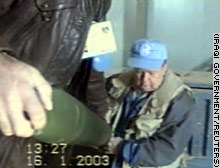 The mainstream U.S. news has been reporting that inspectors have found undeclared chemical warheads in Iraq, and it has been made to sound like "Aha, they lied, they had chemical warheads hidden, hoping we wouldn't find them". What they found were some old boxes, from the 1980s, covered with birdshit, that had never been opened, and which contained empty artillery shells. That is first of all within what is allowed for Iraq, and secondly, they were empty. Meaning, they could get filled with chocolate pudding or with explosives or with chemicals, but they weren't. At the bottom is a detailed response to the story, from somebody who knows what they're talking about. The mainstream U.S. news has been reporting that inspectors have found undeclared chemical warheads in Iraq, and it has been made to sound like "Aha, they lied, they had chemical warheads hidden, hoping we wouldn't find them". What they found were some old boxes, from the 1980s, covered with birdshit, that had never been opened, and which contained empty artillery shells. That is first of all within what is allowed for Iraq, and secondly, they were empty. Meaning, they could get filled with chocolate pudding or with explosives or with chemicals, but they weren't. At the bottom is a detailed response to the story, from somebody who knows what they're talking about.
And now the news is that the inspectors have found 3000 pages of information related to making nuclear weapons at the home of a top nuclear scientist, and those hadn't been listed in the official declaration. And they turn out to be old notes about an attempt to use lasers for isotope isolation, which project was abandoned in 1987.
There is a pattern there, which is obviously intended towards finding Iraq in violation of *something*, whether it is really of importance or not. It is a clever and effective pattern to use to do somebody in. The scheme is simply to make complex demands of what the country is supposed to declare, and when and how, and then, the moment they're a little late, or they forgot something somewhere, or they didn't do it exactly right, they can be shown to be in violation. It's a great plan. A country-wide bureaucracy will never be able to make a full and acurate inventory of everything they have anywhere. Particularly not a corrupt dictatorship of a country, who's infrastructure has already been destroyed several times. Are they going to remember all the places they stored some boxes of artillery shells? No. I'm sure, if you asked the U.S. military to do an inventory, they would forget hundreds of thousands of tons of deadly stuff, underground facilities, whole bases, missiles, submarines and who knows what, just because they can't keep track of it.
According to the same principle, you could go and methodically investigate the home of just about anybody in a typical western country, like me or one of my neighbors. And you would, I'd guess in at least 50% of the cases, find material enough to brand people as criminals, perverts, drug addicts, tax evaders, or whatever you happen to be looking for. If you don't really add things up in context, it is very easy to destroy the reputation of even the best of people. And for a screwed up country like Iraq, run by a crazy dictator, they're having a remarkably hard time doing the same thing.
[ Politics | 2003-01-18 18:12 | | PermaLink ] More >
|
|
| Wednesday, January 15, 2003 |  |
|
|
|
John le Carre has an excellent article in The Times. It has been said in various ways already, and it is all an embarrassing farce, but it always helps when somebody famous sticks their neck out a bit."The reaction to 9/11 is beyond anything Osama bin Laden could have hoped for in his nastiest dreams. As in McCarthy times, the freedoms that have made America the envy of the world are being systematically eroded. The combination of compliant US media and vested corporate interests is once more ensuring that a debate that should be ringing out in every town square is confined to the loftier columns of the East Coast press.
The imminent war was planned years before bin Laden struck, but it was he who made it possible. Without bin Laden, the Bush junta would still be trying to explain such tricky matters as how it came to be elected in the first place; Enron; its shameless favouring of the already-too-rich; its reckless disregard for the world’s poor, the ecology and a raft of unilaterally abrogated international treaties. They might also have to be telling us why they support Israel in its continuing disregard for UN resolutions. But bin Laden conveniently swept all that under the carpet."
[ Politics | 2003-01-15 23:59 | | PermaLink ] More >
|
|
|
|
 The U.S. Supreme Court today ruled in the Eldred vs. Ashcroft case, rejecting the arguments for curbing Congress' ability to extend copyrights forever. Large media corporations like Disney want to sit on their exclusive ownership forever, even if they don't know what to do with the old stuff. See Wired. Lawrence Lessig had been arguing the case, and has been a champion for slowing down the copyright crazyness, and it seems like he did the best possible job. But billions of dollars can buy many congressmen and judges, so it wasn't like there were a great chance. The U.S. Supreme Court today ruled in the Eldred vs. Ashcroft case, rejecting the arguments for curbing Congress' ability to extend copyrights forever. Large media corporations like Disney want to sit on their exclusive ownership forever, even if they don't know what to do with the old stuff. See Wired. Lawrence Lessig had been arguing the case, and has been a champion for slowing down the copyright crazyness, and it seems like he did the best possible job. But billions of dollars can buy many congressmen and judges, so it wasn't like there were a great chance.
I think the answer will have to be to start writing the big media assembly line companies out of the picture altogether. There's no in-between. Anyway, technology is quickly going towards that the little people can make fine movies in their garage with cheap equipment. So, let's out-compete the BigCo's who want to own all creativity in the world.
[ Politics | 2003-01-15 23:59 | 0 comments | PermaLink ]
|
|
|
|
Robert Muller, from '5000 Ideas & Dreams For A Better World' - Idea 53, September 1994:"Children and students are graded for their performance and behavior. Why should not governments be graded too for their performance? A yearly performance report should be produced by the UN or by an outside organization similar to Amnesty International.
A Performance International can show for example:- the number of years a country has lived in peace with others,
- violence statistics,
- ratification of international treaties,
- implementation of UN recommendations on a host of subjects (human rights, labor relations, the environment, etc.),
- disarmament, shifting of military expenditures to peaceful, productive and social services,
- demilitarization, etc.
Such a report would lead to a lot of good in the world."
[ Politics | 2003-01-15 23:59 | 0 comments | PermaLink ]
|
|
| Monday, January 6, 2003 |  |
|
|
|
 From Kim Baker in South Africa: From Kim Baker in South Africa:Our beloved Desmond Tutu has spoken out
against the USA's stance on Iraq. An extract: "I'm shocked to see a powerful country use its power frequently, unilaterally," said Tutu, who won the Nobel Peace Prize in 1984 for opposing apartheid. "The United States says: 'You do this to the world. If you don't do it, we will do it.' That's sad," he said. "When does compassion, when does morality, when does caring come in?" he asked. "I just hope that one day that people will realise that peace is a far better path to follow." And Kim says:"At this time especially, I am really proud to be South African. I am proud that our government is keeping a level head, and not going along with the "boys" Bush, Blair, Howard, and others, but rather making independent decisions, and maintaining a perspective of considering what is right for the global good." Yes, indeed. I'm very un-proud of sort of being an American at this point. Here in the Dark Ages.
[ Politics | 2003-01-06 11:15 | | PermaLink ] More >
|
|
| Saturday, January 4, 2003 |  |
|
|
|
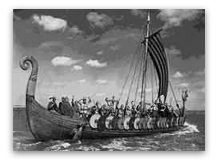 This article is using Medieval Iceland to try to illustrate how a stateless legal order can actually work. This article is using Medieval Iceland to try to illustrate how a stateless legal order can actually work."The settlers of Iceland divided the country into 4 regions. Each region had 9 godord and the godord were divided into three things. The godord were divided into groups of three and each thing had three godord.
The word 'godord' has two definitions. Godord represented a group of men. These men gave allegiance or alliance to a specific godi. A godi is the leader or chief who constructed a place of worship for his pagan followers. The godord was also a collection of rights, the right to represent the law making body of Iceland.
David Friedman states, "…seats in the law-making body were quite literally for sale." These men who were law-makers did not have power just because they held the title godord. They were powerless "unless he could convince some free-farmers to follow him." This kept tyranny and injustice in check.
Jesse Byock states in his book that, "leadership evolved in such a way that a chieftain's power and the resources available to him were not derived from an exploitable realm." This was because free farmers could change allegiance between godi without moving to a new geographical location. "The legal godi-thingman bond was created by a voluntary public contract." The ability to switch legal systems with out moving, is key to a decentralized system. It creates secession down the level of the individual, making all governance structures formed truly voluntary." OK, so the key seems to be that people can decide and change their vote for representation in real time, so nobody can hold on to power from being elected as the ruler of some geographical region. If I don't like what my representative is doing, I switch to another one. That sounds good. But the article goes on to somehow conclude that it would make sense to make corporations run our legal system, which I certainly couldn't agree with.
[ Politics | 2003-01-04 23:54 | 0 comments | PermaLink ]
|
|
|
|
Some big high tech companies have apparently decided to throw their weight into being against some proposed laws that would force copy protection to be embedded into PCs and an array of consumer devices, as asked for by Disney and other big media owners. So, that is good news, and it essentially means that those laws will not go through. As Microsoft and Intel obviously have more votes than regular people. According to Mercury News:
The Business Software Alliance and Computer Systems Policy Project -- two prominent high-tech trade groups representing Intel, Hewlett-Packard, Microsoft and other Silicon Valley heavyweights -- are forming a new coalition and working to enlist support from consumer and business groups.
They hope to convince Congress that strict copy-protection legislation setting technological mandates would stifle innovation, harm consumers and threaten an already-suffering tech industry.
[ Politics | 2003-01-04 23:54 | | PermaLink ] More >
|
|
| Tuesday, December 31, 2002 |  |
|
|
|
From an article by Michael Parenti, quoted at SynEarth
"The super rich, the less than 1 percent of the population who own the lion's share of the nation's wealth, go uncounted in most income distribution reports. Even those who purport to study the question regularly overlook the very wealthiest among us. For instance, the Center on Budget and Policy Priorities, relying on the latest U.S. Census Bureau data, released a report in December 1997 showing that in the last two decades "incomes of the richest fifth increased by 30 percent or nearly $27,000 after adjusting for inflation." The average income of the top 20 percent was $117,500, or almost 13 times larger than the $9,250 average income of the poorest 20 percent.
But where are the super rich? An average of $117,500 is an upper-middle income, not at all representative of a rich cohort, let alone a super rich one. All such reports about income distribution are based on U.S. Census Bureau surveys that regularly leave Big Money out of the picture. A few phone calls to the Census Bureau in Washington D.C. revealed that for years the bureau never interviewed anyone who had an income higher than $300,000. Or if interviewed, they were never recorded as above the "reportable upper limit" of $300,000, the top figure allowed by the bureau's computer program. In 1994, the bureau lifted the upper limit to $1 million. This still excludes the very richest who own the lion's share of the wealth, the hundreds of billionaires and thousands of multimillionaires who make many times more than $1 million a year. The super rich simply have been computerized out of the picture." That is probably a pattern to watch. A lot of things can go unreported and relatively unnoticed because there just isn't an official category for it. You won't be counted in the traffic statistic if you fly your own jet. You won't be counted as a bank customer if you own the bank. Your political views won't be polled, because you're more likely to buy both candidates than to vote for anybody. There's a level at which you become invisible among the regular folks.
[ Politics | 2002-12-31 14:02 | 0 comments | PermaLink ]
|
|
| Monday, December 30, 2002 |  |
|
|
|
In this article a guy named Chris Wilson describes in detail his experiences and his thought process while he is re-evaluating what kind of libertarian he is. Some excellent analysis there of some of the integral principles of capitalism.
"My experience in the work world forced me to seriously reconsider my advocacy of capitalism in any form. As I was still very committed to libertarian principles, I began to study the "socialist anarchists". (I put "socialist anarchist" in quotes, as I now consider such a term to be a redundancy -- anarchists are necessarily socialists.) I forced myself to consider the fundamental disagreement that separates Bakunin, Kropotkin, and Malatesta from Rand, von Mises, and Friedman. My answer to myself: The advocates of capitalism believe that one can sign away or sell off one's liberty, whereas anarchists do not. As a right-wing libertarian capitalist, I was of the opinion that one could enter into a morally binding agreement in which one sacrifices one's liberty in exchange for a wage. My position was that a worker would be committing fraud against the employer if he attempted to retain rights to the full product of his labor. My argument was that if an employer has a "legitimate" prior claim upon the capital being used, then he has the right to dictate its terms of use. The laborer doesn't have the right to anything more than what the capitalist agrees to give, just as the capitalist doesn't have the right to take anything more than what the laborer agrees to give. (Of course, I didn't realize in my early "anarcho-capitalist" days that capitalists almost always demand more than what the worker initially agrees to give.)
My current position is that one cannot be ethically bound by agreements that restrict one's liberty to be self-governing. It has always been my view that one cannot be bound by an agreement to be a slave. Although one can enter into a contract that mandates one to serve as a slave, one should be considered free to cease honoring that contract at any time." What I find particularly important there is the part about whether one can sign away one's freedoms or not. So much in our current capitalist society is based on the principle of tricking people into situations they wouldn't freely choose, if they were fully informed. I agree with the writer. It isn't acceptable that one can trick people out of their liberty just by making the small print small and convoluted enough.
[ Politics | 2002-12-30 23:59 | | PermaLink ] More >
|
|
| Sunday, December 29, 2002 |  |
|
|
|
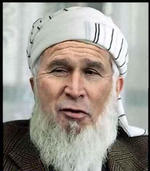 I was watching a documentary on Jimmy Carter's presidency the other day. It is striking how he is such an intelligent and hardworking person, who's always trying to do what his heart tells him is the right thing to do, so he can act with integrity. And he accomplished some remarkable things both while he was president and after, in terms of brokering peace internationally. But at the same time he was one of the most unpopular and unsuccessful U.S. presidents ever, according to popularity polls during his presidency, lower than any previous president in history. Which points us to something very important which he didn't do. He didn't manage the public perception of him or the country or the world. He speaks in a boring monotone and doesn't pay much attention to public relations. So things go badly in the economy and in polls, because people don't have confidence that things are good. Whereas an actor like Ronald Reagan gave great speeches, and seemed confident and inspiring, so people responded accordingly. He mushroomed taxes and national debt more than any U.S. president every had, effectively nationalizing several trillion dollars worth of private property, while pretending that the government was being trimmed down. What mattered the most was the perception, not what actually happened. And fast forward to George W. Bush, and it is now ALL about perception. He's half illiterate, knew nothing about history or foreign policy, is a recovering alcoholic and cocaine addict, and has many other problems that other candidates would have been nailed for. Now it is no longer necessary to get all the details right, and in most situations it doesn't really matter much if the facts are all wrong. As long as the president is looking good, looking confident while he says the right things, and as long as there are a bunch of people supporting him who do likewise, it doesn't really matter if the only reason for bombing Iraq is to get at its oil business. Doesn't really matter if nothing much came out of the investigation of 9/11. Doesn't really matter if Bin Laden gets to go free for no good reason. Doesn't really matter that the U.S. is now more in debt than ever before, and that military expenditures are skyrocketing. All that matters is managing the confidence in the system as it is. I was watching a documentary on Jimmy Carter's presidency the other day. It is striking how he is such an intelligent and hardworking person, who's always trying to do what his heart tells him is the right thing to do, so he can act with integrity. And he accomplished some remarkable things both while he was president and after, in terms of brokering peace internationally. But at the same time he was one of the most unpopular and unsuccessful U.S. presidents ever, according to popularity polls during his presidency, lower than any previous president in history. Which points us to something very important which he didn't do. He didn't manage the public perception of him or the country or the world. He speaks in a boring monotone and doesn't pay much attention to public relations. So things go badly in the economy and in polls, because people don't have confidence that things are good. Whereas an actor like Ronald Reagan gave great speeches, and seemed confident and inspiring, so people responded accordingly. He mushroomed taxes and national debt more than any U.S. president every had, effectively nationalizing several trillion dollars worth of private property, while pretending that the government was being trimmed down. What mattered the most was the perception, not what actually happened. And fast forward to George W. Bush, and it is now ALL about perception. He's half illiterate, knew nothing about history or foreign policy, is a recovering alcoholic and cocaine addict, and has many other problems that other candidates would have been nailed for. Now it is no longer necessary to get all the details right, and in most situations it doesn't really matter much if the facts are all wrong. As long as the president is looking good, looking confident while he says the right things, and as long as there are a bunch of people supporting him who do likewise, it doesn't really matter if the only reason for bombing Iraq is to get at its oil business. Doesn't really matter if nothing much came out of the investigation of 9/11. Doesn't really matter if Bin Laden gets to go free for no good reason. Doesn't really matter that the U.S. is now more in debt than ever before, and that military expenditures are skyrocketing. All that matters is managing the confidence in the system as it is.
My point here is not the politics. Rather, the world seems to have gradually changed so it is more and more about the perception of what is going on, rather than what really is going on. It is a virtual reality. That is both good and bad. The bad part is that slick political and corporate rulers can use the mass media to create the picture of reality that they would like to create. The good part is that it is public opinion that really rules the world. It is what you and I think, and what you and I see, that makes a difference, if there are enough of us. Which means, you don't necessarily have to figure out how to be president, or how to run a billion dollar company, or how to own an army. You just need to figure out how to influence public opinion in a more useful direction. It is not controlled, only influenced or inspired. If most people in the world stopped voting for people who mislead them, while pursuing special interests; if most people in the world stop buying products from companies who don't have their best interest in mind - the power structures would change very quickly. And how it all looks is now more important than who owns what. If public opinion changes its mind, and starts believing in totally different structures, and SEEING different structures - that would be the new world order.
[ Politics | 2002-12-29 18:12 | | PermaLink ] More >
|
|
| Saturday, December 28, 2002 |  |
|
|
|
 Transcript of talk by Noam Chomsky on Taking Control of Our Lives: Freedom, Sovereignty, and Other Endangered Species. Much good historical stuff. For example, he says this about corporations: Transcript of talk by Noam Chomsky on Taking Control of Our Lives: Freedom, Sovereignty, and Other Endangered Species. Much good historical stuff. For example, he says this about corporations:A century ago ... corporations were granted the rights of persons by radical judicial activism, an extreme violation of classical liberal principles... They were also freed from earlier obligations to keep to specific activities for which they were chartered... Furthermore, in an important move, the courts shifted power upwards, from the stockholders in a partnership to the central management, which was identified with the immortal corporate person." And about who are the main enemies of (personal) freedom and (regional) sovereignty on the planet:"An array of mega-corporations, often linked to one another by strategic alliances, administering a global economy which is in fact a kind of a corporate mercantilism tending toward oligopoly in most sectors, heavily reliant on state power to socialize risk and cost and to subdue recalcitrant elements." Very well put. He goes on to describe very well how the current power structure in the world is not much more than a continuation of previous times where kings ruled and basically owned the kingdom, and all political, economic and legal structures were designed to keep it that way, and to keep the people from ever having any real power. The elites who own things are protected from the general population. Things are structured so that popular opinion is essentially irrelevant if it conflicts with the aims of the ruling elite."One striking example (there are many) has to do with the international economic order -- what are called trade agreements. The general population, as polls make very clear, is strongly opposed to most of what's going on but the issues don't arise. It's not an issue in the elections because the centers of power, the minority of the opulent, are unified in support of instituting a particular kind of socio-economic order. So therefore, the issue doesn't arise. The things that are discussed are things that they don't much care about. Like questions of character or questions of reform which they know that aren't going to be implemented. So that's what discussed. Not what people care about. And that's pretty typical and it makes sense on the assumption that the role of the public as the ignorant and meddlesome outsiders is just to be spectators." If the population actually starts organizing itself, it would ironically not be considered democracy, but more like a crisis of democracy. The kind of thing that riot police and press silence might calm down eventually.
[ Politics | 2002-12-28 16:38 | | PermaLink ] More >
|
|
| Thursday, December 26, 2002 |  |
|
|
|
 Entry talks were recently completed in Copenhagen with 10 mostly ex-communist countries that soon will be joining the European Union. The countries are Hungary, Poland, the Czech Republic, Slovakia, Slovenia, Estonia, Latvia, Lithuania, Malta and Cyprus. I've never been sure whether the EU is a good or a bad thing - whether it removes unnecessary bureaucratic divisions and increases cooperation, or whether it becomes a bureaucratic big-corporation-lobbied central government. Junius has some interesting thoughts on how the new countries change the equation: Entry talks were recently completed in Copenhagen with 10 mostly ex-communist countries that soon will be joining the European Union. The countries are Hungary, Poland, the Czech Republic, Slovakia, Slovenia, Estonia, Latvia, Lithuania, Malta and Cyprus. I've never been sure whether the EU is a good or a bad thing - whether it removes unnecessary bureaucratic divisions and increases cooperation, or whether it becomes a bureaucratic big-corporation-lobbied central government. Junius has some interesting thoughts on how the new countries change the equation:"My take on this, for what it's worth, is that it gives the UK everything that lukewarm Europhiles/moderate Eurosceptics have always wanted. EU will now be so large and will vary so much in cultural and economic conditions that a thoroughgoing federalist project is dead in the water. The centre - Brussels and Strasbourg - will be fatally weakened vis-à-vis the component parts of the union because twenty-five (or more) states will find it almost impossible to reach agreement on anything but the most anodyne proposals. Moreover, the disparities in wealth within the zone mean that it will be much harder to impose anything like common standards in matters like employment and social security for the EU as a whole. Think about it: a common minimum wage for Germany, France and the UK might be a crazy proposal, but it isn't quite so crazy that there isn't someone who might suggest it. A common minimum wage for Latvia and the Netherlands: the most starry-eyed Euroenthusiast, even fortified by several glasses of champagne, isn't going to entertain the notion!"
[ Politics | 2002-12-26 04:55 | 0 comments | PermaLink ]
|
|
| Wednesday, December 25, 2002 |  |
|
|
|
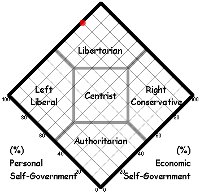 I sort of considered myself libertarian. But then there is this libertarian who was running for office somewhere and who for some reason was e-mailing me his various statements and letters to the editor, etc. And when I finally got around to looking at them, I realized I disagreed with a lot of he was saying. Anti-environmentalist, pro-corporate kinds of views. When I wrote to him, to ask to get off his list, and I told him he sounded more like a religious right republican than a libertarian, he wrote back with some surprise, saying that he scored 100-100 on the libertarian quiz and that he agreed with 100% of the libertarian party platform. I sort of considered myself libertarian. But then there is this libertarian who was running for office somewhere and who for some reason was e-mailing me his various statements and letters to the editor, etc. And when I finally got around to looking at them, I realized I disagreed with a lot of he was saying. Anti-environmentalist, pro-corporate kinds of views. When I wrote to him, to ask to get off his list, and I told him he sounded more like a religious right republican than a libertarian, he wrote back with some surprise, saying that he scored 100-100 on the libertarian quiz and that he agreed with 100% of the libertarian party platform.
So, I figured I've better take that test and re-evaluate things a bit for myself. It is actually a rather good test, based on a more sensible political spectrum than the normal left-undecided-right thing. There are some important dimensions missing, which I'll get to in a moment, but it does make things more clear. The idea is that the Liberal Left wants people to be free when it comes to their personal behavior (but wants to control their money), and the Conservative Right wants people to be free when it comes to money (but want to control people's behavior and morals). An Authoritarian wants to control all of it, and a Libertarian wants people to be free both when it comes to money and personal morals.
[ Politics | 2002-12-25 18:41 | | PermaLink ] More >
|
|
|
|
 The biggest obstacle blocking the emergence of a free and peaceful world is in my opinion the legal concept of a corporation. It is, in principle, very easily removed, as it is only a legal fiction in the first place, and not any naturally occuring 'god-given' phenomenon or right. Corporations only exist because there are laws saying that they can. In practice it will be very hard to change, exactly because the current corporations can put vast resources to use in protecting and expanding their own power. The biggest obstacle blocking the emergence of a free and peaceful world is in my opinion the legal concept of a corporation. It is, in principle, very easily removed, as it is only a legal fiction in the first place, and not any naturally occuring 'god-given' phenomenon or right. Corporations only exist because there are laws saying that they can. In practice it will be very hard to change, exactly because the current corporations can put vast resources to use in protecting and expanding their own power.
People should certainly be able to organize themselves and operate as a group or organization. But a corporation is something else. A corporation is allowed the rights of a natural person. However, it has responsibilities and liabilities less than a natural person. And it can live eternally.
These things can be useful and sensible when it is a small group of people who are trying to operate a business activity together. The initial people don't have to be too worried about being personally liable for the potential failure of the business, and the business can open a bank account for itself, and it can be continued even if the original participants drop out for some reason.
But when it grows bigger, there are certain key design features that start to become prevalent. A corporation is controlled by very few people, but the fuel is provided by a great many people, in the form of investments and manpower.
A large corporation might have the will of one person, carrying out one person's plans, and it has the legal right to act in most arenas as one legal person, but it might have the manpower of 100,000 people, and available resources bigger than those of a small country. All in the hands of a handful of people who don't have any personal liability for what the corporation does.
It is very difficult to successfully convey what a horribly bad idea that is. Most of us are so used to the idea of corporations, and most of us have bought the propaganda that they're inextricably linked to free markets. Nothing could be further from the truth. Large multi-national corporations are the anti-thesis of free markets. They are the communist revolution you never even noticed happening.
[ Politics | 2002-12-25 03:26 | | PermaLink ] More >
|
|
|
|
First Local Government in the United States Refuses to Recognize Corporate Claims to Civil Rights: Bans Corporate Involvement in Governing.On the evening of December 9, 2002, the elected municipal officials of Porter Township, Clarion County -- a municipality of 1,500 residents an hour north of Pittsburgh in Northwestern Pennsylvania -- became the first local government in the United States to eliminate corporate claims to civil and constitutional privileges. The Township adopted a binding law declaring that corporations operating in the Township may not wield legal privileges - historically used by corporations to override democratic decisionmaking -- to stop the Township from passing laws which protect residents from toxic sewage sludge.
The actions by Porter Township thus repudiate the history of state and federal public officials restricting the rights of citizens while expanding the rights of corporations and their owners. ... (more) From Ending Corporate Governanance. Found at wood s lot
[ Politics | 2002-12-25 00:33 | 0 comments | PermaLink ]
|
|
| Monday, December 23, 2002 |  |
|
|
|
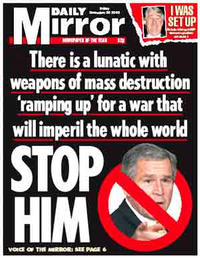 "Canadians to lead weapons inspection team into USA. "Canadians to lead weapons inspection team into USA.
A coalition of Canadian peace groups today announced their intention to send an international team of volunteer weapons inspectors into the United States later this winter. The coalition, Rooting Out Evil, is recruiting inspectors through their newly launched website, www.rootingoutevil.org.
"Our action has been inspired by none other than George W. Bush," said Christy Ferguson, a spokesperson for the group. "The Bush administration has repeatedly declared that the most dangerous rogue nations are those that:
1) have massive stockpiles of chemical, biological, and nuclear weapons;
2) ignore due process at the United Nations;
3) refuse to sign and honour international treaties; and
4) have come to power through illegitimate means.
"On the basis of President Bush's guidelines, it is clear that the current U.S. Administration poses a great threat to global security," said Ferguson. "We're following Bush's lead and demanding that the U.S. grant our inspectors immediate and unfettered access to any site in the country - including all presidential compounds - so that we can identify the weapons of mass destruction in this rogue state," added David Langille... "
[From an e-mail quoted by Spiritseeker]
[ Politics | 2002-12-23 16:05 | | PermaLink ] More >
|
|
|
|
USA
1. Honeywell (rockets, chemical)
2. Spectra Physics (chemical)
3. Semetex (rockets)
4. TI Coating (atomic, chemical)
5. Unisys (atomic, chemical)
6. Sperry Corp. (rockets, chemical)
7. Tektronix (rockets, atomic)
8. Rockwell (chemical)
9. Leybold Vacuum Systems (atomic)
10. Finnigan-MAT-US (atomic)
11. Hewlett-Packard (atomic, rockets, chemical)
12. Dupont (atomic)
13. Eastman Kodak (rockets)
14. American Type Culture Collection (biological)
15. Alcolac International (chemical)
16. Consarc (atomic)
17. Carl Zeiss - U.S (chemical)
18. Cerberus (LTD) (atomic)
19. Electronic Associates (rockets)
20. International Computer Systems (atomic, rockets, chemical)
21. Bechtel (chemical)
22. EZ Logic Data Systems, Inc. (rockets)
23. Canberra Industries Inc. (atomic)
24. Axel Electronics Inc. (atomic)
Britain
1. Euromac Ltd-Uk (atomic)
2. C. Plath-Nuclear (atomic)
3. Endshire Export Marketing (atomic)
4. International Computer Systems (atomic, rockets, chemical)
5. MEED International (atomic, chemical)
6. Walter Somers Ltd. (rockets)
7. International Computer Limited (atomic, chemical)
8. Matrix Churchill Corp. (atomic)
9. Ali Ashour Daghir (atomic)
10. International Military Services (rockets) (owned by the British Ministry of Defence)
11. Sheffield Forgemasters (rockets)
12. Technology Development Group (rockets)
13. International Signal and Control (rockets)
14. Terex Corporation (rockets)
15. Inwako (atomic)
16. TMG Engineering (chemical)
17. XYY Options, Inc (atomic) And so on and so on and so on. Who sold what to Iraq, as contained in the Iraqi arms declaration, brought to you by Andreas Zumach of Die Tageszeitung. The article also lists French, Chinese, Russian, Japanese, Dutch, Belgian, Spanish and Swedish companies. Zumach's articles are available in English here, in the original at taz.de; and there's an interview with Zumach at Democracy Now! [from randomWalks]
[ Politics | 2002-12-23 16:05 | | PermaLink ] More >
|
|
<< Newer stories Page: 1 2 3 4 5 6 7 8 9 Older stories >> |

